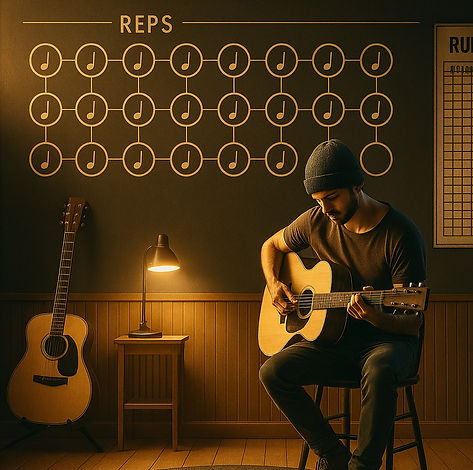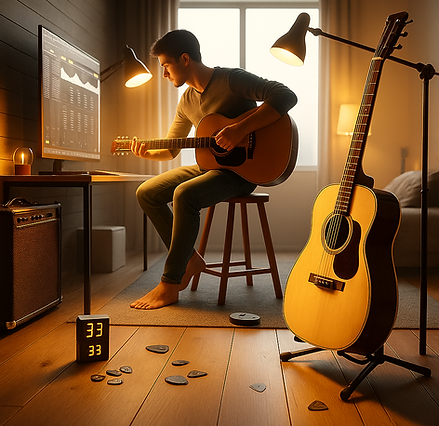
granular guitar habits
Chapters 9 - 12
Chapter 9
Social Influence on Guitar Habits – Surround Yourself with the Right Players
* You pick up the habits of the people around you. If your friends, bandmates, or family play regularly, you’ll naturally do the same. If they don’t, it’s easy to slack off.
* Join a guitar culture where practice is normal. Find a group—an open mic scene, a jam night, a guitar community—where playing regularly is just what people do. When practice is the standard, you’ll rise to it.
* Find a group where you share more than just music. If you connect with people on a deeper level—whether it’s taste in music, approach to learning, or even just personality—you’ll stick with it longer. Belonging keeps you engaged.
* Imitate the best. Watch how dedicated players structure their practice, how they approach challenges, and how they think about music. Copying the right habits speeds up your progress.
* Respect and praise from other musicians fuels motivation. Getting props from fellow players makes practice feel even more rewarding. But be mindful—avoid environments where the norm is unproductive.
* Be careful who you surround yourself with. If a group values excuses over effort, that attitude will rub off on you. Stay close to those who push forward, not those who hold back.
* Your ‘tribe’ shapes your playing habits. If you’re surrounded by people who take their craft seriously, it becomes second nature. Pick your musical environment wisely.
The people around you can either accelerate your progress or slow you down. Choose the ones that make you a better guitarist.


I really relate to this chapter. As I mentioned in the About Me section, I’ve played in bands ever since I first picked up a bass guitar. I consider myself lucky to have met some incredible musicians along the way—people who’ve inspired me and shaped how I think about playing. Because I was introduced to this world so early, it became second nature to seek out others to play with. While it’s been hard work at times, playing in bands has brought me countless great experiences.
Through bands and jam nights, I’ve also learned a lot about other people’s practice routines and the journeys they’ve taken with their playing. I find this fascinating—it’s always unique. I really enjoy hearing about people’s influences and what got them into guitar in the first place. Playing with others and peoples guitar playing journeys are two out of the 7 points and also link to bootcamp discussions, I want to understand your guitar playing journey and how and when that will include playing with others.
That said, I’ve also come across people who can hold you back. They’re not always supportive—sometimes it’s envy, sometimes they just don’t get it. Oddly, they might still be good company in other ways, but when it comes to your passion for playing, writing, or performing, their attitude can be draining. It’s frustrating, but almost inevitable. You either learn to compartmentalise them or move on.
A big part of why I built this site and talk about practice is to connect with people who think like I do—people who care about playing guitar and want to build regular, sustainable habits. The aim is to create a small community that encourages each other to keep going, to share progress, and to stay motivated.
Chapter 10


Fixing Bad Guitar Habits – Make the Right Choice the Easy Choice
* Find the real reason behind your bad habits. If you’re constantly avoiding proper practice, ask yourself why. Is it boredom? Frustration? Lack of progress? Most bad habits are just temporary fixes for deeper problems.
* Bad habits trick you into feeling productive. Mindless noodling, endlessly scrolling gear reviews, or watching guitar videos instead of playing all feel like "doing something"—but they don’t move you forward.
* Replace bad habits with good ones by making practice feel rewarding. The more you link playing with enjoyment, progress, and challenge, the less you’ll fall into unproductive habits.
* Reframe frustrating moments. Struggling with a tricky riff or awkward chord change? Instead of getting annoyed, treat it as a challenge to beat—that shift in mindset makes a massive difference.
* Create a pre-practice ritual. Get yourself in the right headspace before you pick up the guitar. A simple routine—tuning up, stretching your hands, listening to an inspiring track—can set the tone for a solid session.
* If YouTube sucks you into procrastination, find a better pairing. Instead of mindlessly watching videos, pair practice with something enjoyable—like playing along with your favourite tracks or jamming over backing loops.
* Fill your environment with triggers for good habits. Keep your guitar ready to go, make practice the easiest thing to start, and eliminate distractions that pull you off course.
* Remind yourself what you’ll miss by not practicing. Every day you don’t play is a day you’re not improving. Make the cost of skipping practice feel real.
The key? Make good habits effortless and bad habits unattractive. Set yourself up so the best choice is also the easiest one.
Chapter 11
This has similar vibes to chapter 7, I have had bad practice habits - I got past them by applying these 7 points.
I don’t ever get annoyed with anything I can’t play, I breakdown what I can’t play and put it into a practice segment so I can chip away at it daily. I will get better at it.
One of my favourite guitarists is Nuno Bettencourt, he can play insanely fast, has a very clean playing style but is also brilliantly melodic. One of the first albums I got when I was 12 years old was Pornografitti by his band, Extreme. Its a great 80s hair, funk metal album. It has a couple of acoustic tracks on it, their break out hit ‘More Than Words’ but also ‘Hole Hearted’ featuring a 12 string acoustic. The country-ish riff in this is awesome, I must of been on my chip away list for 4 or 5 years from the age of 12, it took me ages to get that sounding right. However, it showed me that concerted effort over time can equate to progress even of something that feels almost unachievable.
In regards to pre-practice ritual - I have a 2 minute warm up routine I do before I start my exercises. I have a plan for my practice (as per 7 points). I fully subscribe to the point of ‘every day you don’t play is a day you’re not improving’ my daily practice habit is currently very strong to the point I very much drive myself to make the daily practice happen.
Making Guitar Habits Easy – Reps Over Perfection
* Stop just planning practice—start playing. Thinking about practicing isn’t the same as doing it. Motion is researching new exercises, watching lessons, or tweaking your routine. Action is actually picking up the guitar and playing. Action wins.
* Repetition is what builds skill. The key isn’t how long you practice—it’s how many times you play something correctly. Get your reps in.
* Frequency beats duration. Practicing for 5 minutes a day is better than one hour-long session once a week. Small, frequent sessions lock in progress faster.
* Habits form through reps, not time. It’s not about how long you’ve been playing, but how many times you’ve played something. 100 clean chord transitions are more valuable than 10 minutes of sloppy strumming.
* Make practice ridiculously easy to start. If setting up your gear is a hassle, you’ll avoid playing. Reduce friction—keep your guitar within reach, your amp dialed in, and your space ready to go.
* Repetition makes guitar habits automatic. There’s no magic number of days to "form a habit"—just keep putting in reps until picking up the guitar feels as natural as grabbing your phone.
* Consistency beats perfection. A sloppy practice session is still better than no practice at all. Don’t wait for the "perfect" routine—just play.
The takeaway? Play often, keep it simple, and trust that repetition builds results. Consistency is king.


The 7 points and breakfast lunch and dinner analogy break this down into a routine and mimmim standards. The bootcamp offers a further supportive hand if required. My approach is more than 5 minutes a day because it is about making real progress and getting a locked in habit.
I agree with the ‘repetition makes guitar habits automatic.. there’s no magic numbers of days to form a habit’ this is obviously despite me offering a 66 day bootcamp to try and do exactly this. There is no magic number, there is some research indicating, on average, 66 days gets you a new habit. This bootcamp is a new idea, I want to know how many people are able to get a habit and then sustain it after the 66 days.
Consistency is king.
Chapter 12


Making Guitar Habits Easy – Reduce Friction, Increase Playing
* We naturally take the easiest option. If playing guitar feels like effort but scrolling your phone is effortless, guess which one wins? Make practice the easy choice.
* Set up your environment for frictionless playing. Your guitar should be out and ready, your picks, capo, and tuner within reach. If you have to dig through a drawer for a pick, you’ve already lost momentum.
* Minimize steps to start playing. Every bit of effort—setting up cables, adjusting gear—adds resistance. Remove those barriers. If it takes more than a few seconds to get started, you’ll be less likely to do it.
* Redesign your space for effortless practice. If your environment makes playing easy, you’ll do it more. If it makes practice a hassle, you’ll avoid it. Think of your space as a practice accelerator.
* Make bad habits harder. If watching TV or scrolling YouTube stops you from practicing, add friction.
* Unplug the TV.
* Put your phone in another room.
* Use a different device for learning so you’re not sucked into distractions.
* The harder a habit is to do, the less likely it happens. If you make procrastination inconvenient and practice effortless, you’ll always lean toward picking up the guitar.
The goal? Shape your space so that playing guitar feels like the most natural, automatic thing to do. Conserve energy for music—not for overcoming obstacles to start.
I have made practice my easy choice by being clearer about the time it is actively possible, almost every day and planning to make it happen. As noted on previous chapters I’m currently playing acoustic and have a number of spots round my house that I can quickly and easily play with the metronome on my iPad or phone.
The point of the 66 day bootcamp is to run through specific points about how we can reduce friction and increase your chance of getting that daily guitar playing habit.